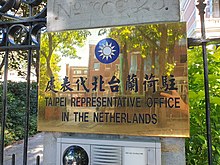| Taipei Economic and Cultural Representative Office | |||||||||||||||||
|---|---|---|---|---|---|---|---|---|---|---|---|---|---|---|---|---|---|
 | |||||||||||||||||
| Traditional Chinese | 臺北經濟文化辦事處 | ||||||||||||||||
| Simplified Chinese | 台北经济文化办事处 | ||||||||||||||||
| |||||||||||||||||
The Taipei Economic and Cultural Representative Office (TECRO), also known as Taipei Economic and Cultural Office (TECO), Taipei Representative Office (TRO) or Taipei Mission, is an alternative diplomatic institution serving as a de facto embassy or a consulate of the Republic of China (ROC, commonly referred to as Taiwan) to exercise the foreign affairs and consular services in specific countries which have established formal diplomatic relations with the People's Republic of China (PRC, commonly referred to as China). The PRC denies the legitimacy of the ROC as a sovereign state and claims the ROC-controlled territories as an integral part of its territory. An exclusive mandate, namely One-China policy, requires that any country wishing to establish a diplomatic relationship with the PRC must first sever any formal relationship with the ROC. According to The Fletcher Forum of World Affairs, "non-recognition of the Taiwanese government is a prerequisite for conducting formal diplomatic relations with the PRC—in effect forcing other governments to choose between Beijing and Taipei."[1][2] As a result, these countries only allow the ROC to establish representative offices instead of a fully-fledged embassy or consulate for the purpose of conducting practical bilateral relations without granting full diplomatic recognition.
Except in Lithuania[3] and Somaliland (opened in 2020), all offices use the capital city "Taipei" and refrain from using the name "Taiwan" or the "Republic of China", since the term "Taipei" avoids implying that Taiwan is a different country on par with the PRC or that there are "Two Chinas", the PRC and the ROC, in order to diminish the obstacles of building pragmatic diplomacy and sidestep the Taiwan issue. The first attempt of using the name "Taiwan" in a Taiwanese diplomatic mission within a non-diplomatic state was when Lithuania broke the tradition with the name Taiwanese Representative Office in Lithuania in 2021. In response the PRC expelled Lithuania's embassy staff from Beijing and downgraded diplomatic relations to charge d'affaires status.[4] Attempts by other countries, including Fiji, to allow ROC government to change the representative office to indicate "Taiwan" later failed and were reversed under pressure from PRC government. [5]
On the other side, offices located in Taiwan usually also use the term "Taipei", though the United States, Japan, and Somaliland (but not Lithuania) use "Taiwan" (for example the American Institute in Taiwan).
TECROs state that their aim is "to promote bilateral trade, investment, culture, science and technology exchanges and cooperation, as well as better understanding", and provide common citizen services towards overseas Taiwanese, such as issuing visas and passports.
TECROs in the United States enjoy many diplomatic privileges such as extraterritoriality, providing consular protection and their staff have diplomatic immunity.[6] Other countries also establish reciprocal representative offices in Taiwan, such as the American Institute in Taiwan, Canadian Trade Office in Taipei and Japan–Taiwan Exchange Association.
- ^ Erikson, Daniel P.; Chen, Janice (2007). "China, Taiwan, and the Battle for Latin America". The Fletcher Forum of World Affairs. 31 (2): 71.
- ^ "The One-China Principle and the Taiwan Issue". China Internet Information Center. Archived from the original on 2019-02-27. Retrieved 2014-04-09.
- ^ https://www.roc-taiwan.org/lt_en/index.html
- ^ "China downgrades Lithuania's diplomatic status over Taiwan row". 21 November 2021. Archived from the original on 18 December 2022. Retrieved 18 December 2022.
- ^ https://www.taipeitimes.com/News/taiwan/archives/2023/06/23/2003802043
- ^ New US diplomatic immunity pact a breakthrough: MOFA Archived 2016-10-21 at the Wayback Machine, The China Post, February 6, 2013